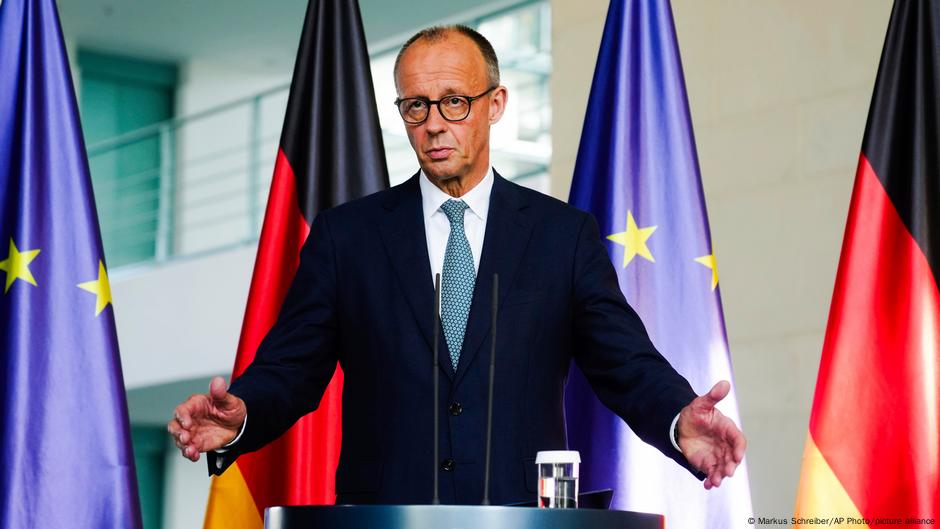
Political Divisions Over Germany’s Arms Export Ban to Israel
Chancellor Friedrich Merz of Germany has faced significant internal criticism from members of his own conservative Christian Democratic Party (CDU) and its Bavarian sister party, the Christian Social Union (CSU), over his decision to impose a partial export ban on arms to Israel. This move has sparked a heated debate within the ruling coalition, with some politicians expressing strong opposition while others have voiced support.
The decision to halt German weapons exports to Israel for use in the Gaza Strip "until further notice" has been met with fierce resistance from certain factions within the CDU and CSU. Alexander Hoffmann, the CSU parliamentary group leader in the Bundestag, criticized the move as a departure from decades of foreign policy continuity toward Israel. He emphasized that the party was not involved in the decision and called it questionable. Hoffmann also stressed the need for an explanation, stating that the decision requires internal discussions within the coalition.
This backlash is partly rooted in the historical context of Germany's relationship with Israel. Given the country’s history with the Holocaust, there is a deep-seated sense of responsibility towards Israel. Some conservatives argue that Merz’s decision contradicts this long-standing principle known as “Staatsräson” (reason of state). Roderich Kiesewetter, a CDU security policy expert, described the move as a “serious political and strategic mistake by Germany.”
Despite the opposition, there are voices within the CDU/CSU alliance that support the decision. Norbert Röttgen, a CDU foreign policy expert, expressed approval, stating that the reaction is correct and unavoidable due to recent actions by the Israeli government. His comments reflect a growing sentiment among some conservatives who believe that Germany must take a stronger stance against perceived injustices.
In addition to internal divisions, the decision has also drawn support from Merz’s junior coalition partner, the center-left Social Democratic Party (SPD). Vice Chancellor Lars Klingbeil, co-leader of the SPD, expressed solidarity with Israel but emphasized the importance of calling out wrongdoing. His statement highlights the complex dynamics within the coalition, where differing perspectives on foreign policy are being navigated.
The Debate Over Arms Exports and International Relations
The controversy surrounding the arms export ban underscores broader questions about Germany’s role in international conflicts and its foreign policy priorities. Critics argue that the decision could strain relations with Israel, a key ally in the region. Proponents, however, see it as a necessary step to address concerns over the humanitarian situation in Gaza and to align Germany’s policies with its values.
The CDU/CSU parliamentary group is set to hold a videoconference meeting to discuss the issue further. With Germany in summer recess, the spontaneous nature of the meeting highlights the urgency and sensitivity of the matter. The discussions will likely shape the future direction of Germany’s foreign policy and its approach to arms exports.
Humanitarian Efforts and Government Support
While the arms export issue dominates headlines, another pressing concern involves efforts to provide aid to children in Gaza. Several German cities, including Hannover, Dusseldorf, Bonn, Leipzig, and Kiel, have offered to take in and provide medical treatment for seriously ill or traumatized children from the embattled region. However, these initiatives require federal government support to proceed.
Federal authorities would need to manage entry procedures, child selection, and overall coordination of the relief effort. Despite the goodwill of local communities, the federal government has yet to finalize its position on the plan. This delay has raised questions about the government’s capacity and willingness to act on humanitarian issues during times of crisis.
Conclusion: A Nation at a Crossroads
Germany finds itself at a crossroads, balancing its historical responsibilities, current geopolitical tensions, and domestic political pressures. The debate over arms exports to Israel reflects deeper ideological divides within the ruling coalition and raises critical questions about the country’s foreign policy direction. As discussions continue, the outcome will have far-reaching implications for Germany’s relationships with its allies and its role on the global stage.
